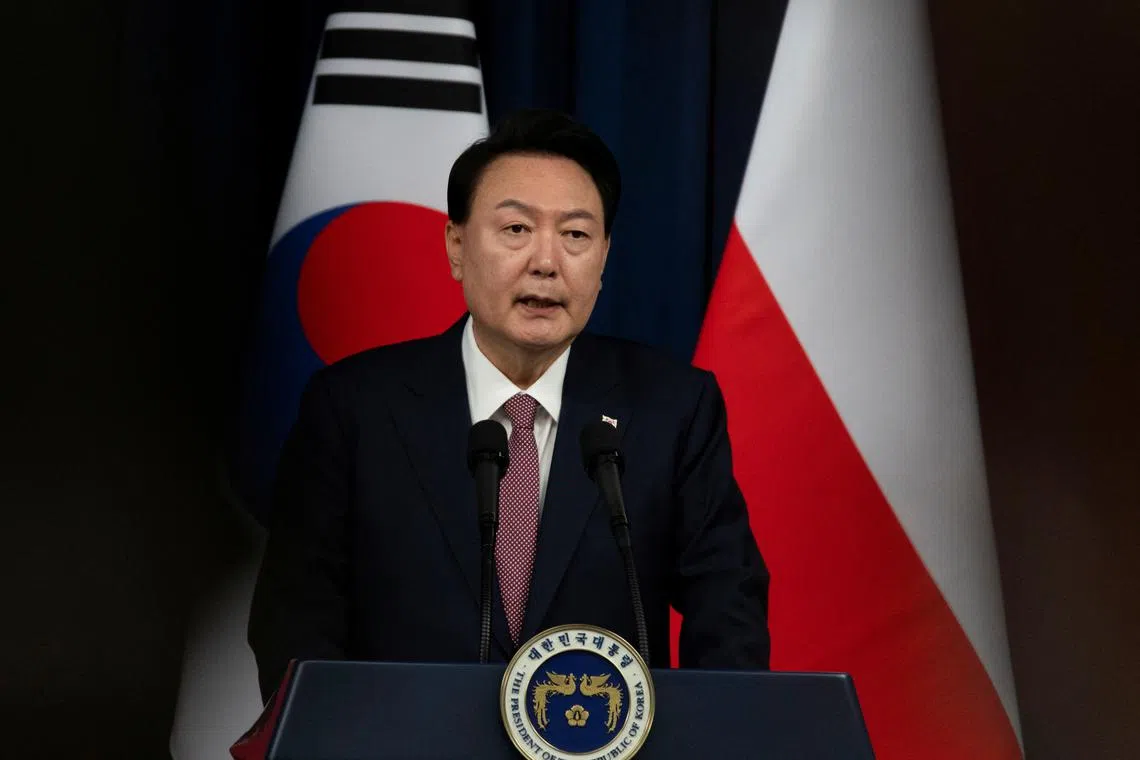South Korea’s Yoon praises Trump in phone call as trade officials brace themselves for tariffs
Sign up now: Get ST's newsletters delivered to your inbox

South Korean President Yoon Suk Yeol and Donald Trump shared concerns over North Korea’s deployment of troops backing Russia.
PHOTO: REUTERS
Follow topic:
SEOUL – South Korean President Yoon Suk Yeol spoke to Donald Trump on Nov 7 and congratulated him on winning the US presidency on the “Make America Great Again” slogan, as officials in Seoul worked to prepare for “significant” economic changes.
Mr Yoon and Trump held a 12-minute phone call and discussed the close security and economic ties of their two countries across all areas, a senior South Korean official said on Nov 7.
South Korea’s ambassador to the US will also visit Trump’s Mar-a-Lago home in Florida to meet members of the President-elect’s camp, the foreign ministry said.
Trump’s election has renewed attention in South Korea to his “America First” foreign policy plans and how his unpredictable style will play out in his second term.
South Korean officials worked past midnight on Nov 6 to prepare for changes expected from US policies, with the Bank of Korea and think-tanks seeing a potential hit to exports if the US hikes tariffs.
Meetings at the Trade Ministry that began in the hours after Trump’s victory led to back-to-back discussions early on Nov 7 as South Korea’s economic chiefs weighed the impact on exports of tariff levels floated by Trump ahead of the election.
“Should (the) policy stance that has been stressed by Pesident-elect Trump become realised, the impact on our economy is expected to be significant,” Finance Minister Choi Sang-mok said at a Nov 6 meeting with trade and foreign ministers in Seoul.
South Korea would probably suffer less than China, Mexico and the European Union but Asia’s fourth-largest economy could be forced into another renegotiation of its bilateral free trade agreement with Washington, according to Mr Kim Young-gui, an economist at the Korea Institute for International Economic Policy (Kiep).
“Trump’s main target would be the countries that are making surplus in bilateral trade. So Seoul could be asked to redo the deal again once Washington is done with renegotiating the USMCA (US-Mexico-Canada Agreement),” he said.
Economic blow
South Korea’s exports could fall a cumulative US$44.8 billion (US$59.5 billion) over several years, shrinking its economy an estimated 0.67 per cent should Trump follow through with his pledge to impose universal tariffs, a report by the Kiep said last week.
Trump has pledged to impose tariffs of as much as 60 per cent on China and a universal 10 per cent tariff on imports from all countries.
China and the US are South Korea’s top two trading partners because of its focus on chips, cars and petrochemicals.
Mr Kim Tae-hyo said Trump noted South Korea’s success in shipbuilding and vessel maintenance during the call with Mr Yoon and said he looked forward to discussing how South Korea could aid the American shipbuilding industry.
Hana Securities analyst Wee Kyung-jae said Trump’s comment likely reflected the weakness of the US shipbuilding industry, which is unable to meet the demands of commercial shipping and the US Navy.
Shares in shipbuilders HD Hyundai Heavy Industries and Hanwha Ocean rose more than 10 per cent, while Samsung Heavy Industries gained 9 per cent, after Trump’s comment was reported.
Alliance questions
Mr Yoon and Trump also shared concerns over North Korea’s deployment of troops to Russia in its war against Ukraine and its continued military provocations such as ballistic missile launches, Mr Kim Tae-hyo told reporters.
Mr Yoon will need to find a way to use their personal friendship to advance Seoul’s interests, said Ms Kim Du-yeon of the Centre for a New American Security.
“This might be the only way to avert devastating consequences and surprises in the alliance relationship - including South Korean questions about Washington’s defense commitment - that we currently assume would happen based on Trump’s harsh rhetoric against allies and transactional style,” she said.
The US election and Trump’s run for a second term have been watched closely in South Korea. Mr Yoon has pushed for closer security ties with Washington and for greater three-way cooperation together with Japan.
Mr Yoon told Trump the success of three-way cooperation between South Korea, Japan and the US was due in part to the foundation laid by Trump’s first presidency.
Trump has accused South Korea, a key Asian ally, of getting a “free-ride” on US military power and demanded it pay far more of the cost of keeping American troops in the country to counter the threat of aggression by North Korea.
On Nov 4 – a day before the US election – South Korea and the Biden administration signed a five-year plan under which Seoul agreed to an 8.3 per cent jump in its 2026 contribution to the cost of maintaining US bases in the country to 1.52 trillion won (S$1.45 billion), with future increases capped at 5 per cent.
Later on Nov 7 at a news conference, Mr Yoon pledged to strengthen the alliance spanning economic and technological cooperation on the global stage.
“We will be building a perfect security posture together with the new administration in Washington and safeguard our freedom and peace,” he said. REUTERS

